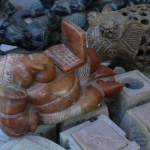 My day begins with a cup of tea; well actually it begins with the ritual of fixing that perfect cuppa. Out come the tea set and the tea-cosy. Boiling water is poured over tea leaves and allowed to soak in the tea pot to bring out the flavour, not a minute more, not a minute less. Not too milky, a dash of sugar and the perfect brew is ready.
My day begins with a cup of tea; well actually it begins with the ritual of fixing that perfect cuppa. Out come the tea set and the tea-cosy. Boiling water is poured over tea leaves and allowed to soak in the tea pot to bring out the flavour, not a minute more, not a minute less. Not too milky, a dash of sugar and the perfect brew is ready.
For the husband and me, it is almost like an initiation of the long day ahead. Sipping our tea, we pore over the newspapers (we read three of them), have a good laugh or a heated debate as we leaf through the news.
We make it a point to wake up early, just so that we have enough time to luxuriate in the stillness of the morning. It is our moment together, before the day comes crashing on to us, submerging us with its breathless pace and sometimes its unexpectedness.
Most of us have an almost symbiotic relationship with our cup of beverage. As the hot liquid surges through our insides, it energizes us and awakens us nerve by nerve. An early wintry morning and chances are you will spot roadside tea vendors surrounded by the odd rickshaw-wallah or a mason on their way to work. They sit hunched on the pavement, with their hands wrapped around the steaming glass, sipping the hot frothy tea in respectful silence, as if paying obeisance.
Quite a few of us are addicted to our cup of chai – a splitting headache and you reach out for it to unclog your nerves. It rains incessantly, the temperature dips and you yearn for adrak ki chai with assorted savouries. If your nagging cough and cold is making you feel wretched, buss ek cup chai is expected to do wonders.
Remember travelling by train and having tea in khullars? Even if the tea was mostly ghastly, the earthen khullars made it special. And now thanks to modernisation courtesy our ex Railway minister Laloo Prasad Yadav, we get to have our tea in Styrofoam cups. It’s still as ghastly and I can barely take a sip. Chai in Styrofoam cups is not chai!!!!
When it comes to tea, we all have our rigid preferences – in North the chai is usually boiled with milk, sugar and assorted spices, till it reaches a thick consistency. Down south, people may prefer filter coffee, but tea from Niligiris has its niche. Bhadralok Bongs are loyal to Darjeeling tea and turn their nose up at any other variety. The road-side vendors do a frothy version, with dollops of sugar and top it with a dash of malai. The office version is an indifferent concoction which most of us have out of desperation. The tea bag variety is a convenient, unmessy option. You can have your tea hot, cold, green, black, with lemon, herbs or as a fruit infusion – the options are limitless.
Tea is mostly an Asian preference with Europeans slowly warming up to it. On our last trip to Copenhagen, we had Sri Lankan Darjeeling tea (whatever that means) almost every day for breakfast and were we glad. Recently I was reading about a Taiwanese version called the bubble tea. It’s an iced, sweet, frothy concoction flavoured with either milk or fruit flavours and has tapioca balls for the added crunch. It sounds gross to me, but hey, to each one his own.
With the advent of Barista and its innumerable cousins, is chai gradually losing its flavour? After all, we are spoilt for choice, with coffee from all corners of the world vying for our attention. Arabica, Italian, Columbian, Ethiopian, take your pick. I remember how my parents used to have long adda sessions with friends, over endless cups of tea. Me, I can’t remember the last time I served tea to my friends.
But even though we may have acquired an improved cosmopolitan outlook and prefer sipping a Segafredo mocha in an upscale mall or entertain our friends with Pinot Noir, yet it is the ubiquitous chai that defines the essence of India. The full-full Indian brew that knows no boundaries, no class, we have no qualms in having it even from a road side shanty. Each stall will have its unique taste, each home will have its distinct brew, but it is chai that unifies this chaotic, heady country called India.














